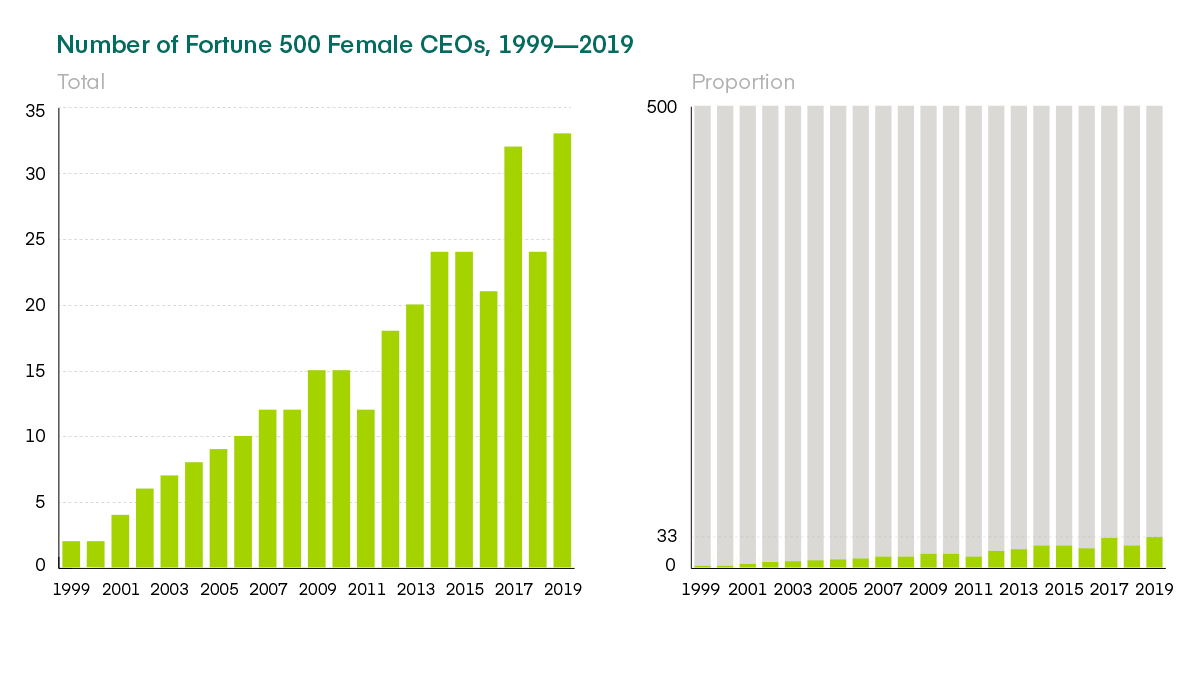Top Companies With Female CEOs
With a high-quality business education that values diversity and inclusion, combined with exceptional leadership abilities, today’s women graduates can also aspire to become catalysts for further positive change.
Over the past 20 years, the number of female CEOs at Fortune 500 companies has been continuously setting all-time records. The positive trend that started with just two women in the late 1990s reached its peak in 2019—with 33 women as leaders of some of the most successful companies in the world.
Recently, MarketBeat published an article highlighting the 10 largest and most prestigious global companies led by women executives. Among the featured CEOs are Beth. E. Mooney of KeyCorp, Phebe Novakovic of General Dynamics, Ginni Rometty of IBM, and others. The article emphasizes that these women are influential, impactful executives who not only create value for the companies they head but also seek to close the racial and cultural gap in leadership.
How Women CEOs Are Changing the Corporate World
It is worth noting that seven out of the 10 female leaders featured on the list hold MBA degrees—and all of those degrees were earned from AACSB-accredited institutions. Getting a quality business education can be an important steppingstone in preparing future management professionals for meaningful corporate careers. AACSB-accredited business schools help prepare tomorrow’s leaders, and diversity and inclusion are an important part of the quality standards that each accredited school must meet. The efforts that business schools make in diversifying their classrooms are helping to reshape the corporate world.
But the impact of these leaders goes far beyond the bottom line. They not only focus on improving the financial performance of their companies but also aim to establish a better workplace culture for the future generations of business leaders. Many featured female leaders have been recognized for their notable success in promoting a culture of inclusiveness within their organizations. For instance, under the leadership of Ginni Rometty, IBM received a prestigious Catalyst Award for advancing diversity and women’s initiatives in the workplace.
Further, several spotlighted CEOs are also recognized for their active community involvement and philanthropic efforts, demonstrating their leadership in societal impact. For example, Beth. E. Mooney of KeyCorp (KeyBank) received the 2017 Women of Note Legacy Award from the Cleveland Foundation for her outstanding business, civic, and philanthropic leadership in Greater Cleveland. Another executive—Phebe Novakovic of General Dynamics—is known for serving on the boards of directors for multiple charitable organizations.
The Gender Gap in Fortune 500 Companies
Although the number of female CEOs at Fortune 500 companies has significantly increased, this growth has not been fast, nor has it been steady. Over the past 10 years, the number of female CEOs in Fortune 500 companies has been experiencing heavy fluctuations. Thus, in 2018, the number of women executives dropped from 32 to 24—a decrease of 25 percent. Further, while the general trend appears to be positive, the reality is still far from perfect. Today, women account only for 6.6 percent of the total number of Fortune 500 executives.

The persistent gender disproportion and inconsistent diversification of the Fortune 500 executive workspace suggest that the positive trend remains vulnerable. As graduate business schools report the increasing number of women applicants, we can be hopeful that the upward dynamics will gain momentum and further solidify.
Women Leaders of Tomorrow
As of January 1, 2020, a total of 82 women have held Fortune 500 CEO roles. Their pioneering work and inspiring stories demonstrate how growth in the number of influential female business leaders can contribute to greater equality and more diverse perspectives in both the corporate and societal domains. With a high-quality business education that values diversity and inclusion, combined with exceptional leadership abilities, today’s women graduates can also aspire to become catalysts for further positive change.






